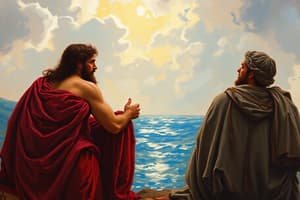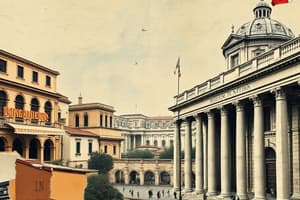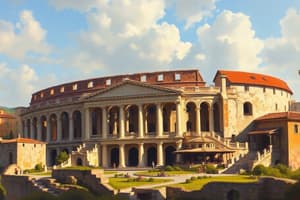Podcast
Questions and Answers
What was the primary reason for the significant population in Italy during ancient times?
What was the primary reason for the significant population in Italy during ancient times?
- Favorable climate for agriculture and animal husbandry (correct)
- Proximity to other major civilizations
- Political stability and governance
- Availability of mineral resources
Which Roman figure was associated with the founding of Rome, as per the mythology?
Which Roman figure was associated with the founding of Rome, as per the mythology?
- Romulus (correct)
- Augustus
- Julius
- Tiberius
What was the political system established in Rome where citizens could choose their leaders?
What was the political system established in Rome where citizens could choose their leaders?
- Monarchy
- Dictatorship
- Republic (correct)
- Oligarchy
What was a significant characteristic of the Etruscan civilization that contributed to Roman culture?
What was a significant characteristic of the Etruscan civilization that contributed to Roman culture?
Which of the following best describes the term 'Veto' in the context of Roman governance?
Which of the following best describes the term 'Veto' in the context of Roman governance?
What was one of the primary goals of Emperor Justinian in the Byzantine Empire?
What was one of the primary goals of Emperor Justinian in the Byzantine Empire?
Which architectural feature is Hagia Sophia known for?
Which architectural feature is Hagia Sophia known for?
What factor contributed to the internal decline of the Roman Empire?
What factor contributed to the internal decline of the Roman Empire?
Which problem arose due to the relocation of the capital to Constantinople?
Which problem arose due to the relocation of the capital to Constantinople?
What was a key cultural trait of the Minoan civilization?
What was a key cultural trait of the Minoan civilization?
What led to the decline of the Minoan civilization?
What led to the decline of the Minoan civilization?
What was one of the characteristics of Mycenaean society?
What was one of the characteristics of Mycenaean society?
Which aspect was NOT a consequence of Germanic invasions on the Roman Empire?
Which aspect was NOT a consequence of Germanic invasions on the Roman Empire?
What event marked the significant naval defeat of the Persians by the Greeks?
What event marked the significant naval defeat of the Persians by the Greeks?
Which league was established by Athens as an alliance against the Persians?
Which league was established by Athens as an alliance against the Persians?
What characterized the period known as the 'Golden Age of Athens'?
What characterized the period known as the 'Golden Age of Athens'?
Which Greek playwright is known for the epics 'Iliad' and 'Odyssey'?
Which Greek playwright is known for the epics 'Iliad' and 'Odyssey'?
What was the major consequence of the Peloponnesian War for Athens?
What was the major consequence of the Peloponnesian War for Athens?
What was the primary focus of philosophy during the time of Socrates and Plato?
What was the primary focus of philosophy during the time of Socrates and Plato?
Which of the following gods was associated with wisdom in Greek mythology?
Which of the following gods was associated with wisdom in Greek mythology?
What were the three styles of ancient Greek columns?
What were the three styles of ancient Greek columns?
After Alexander's death, which area was governed by Ptolemy?
After Alexander's death, which area was governed by Ptolemy?
Which god is recognized as the deity of war in Greek mythology?
Which god is recognized as the deity of war in Greek mythology?
What major societal issue contributed to the weakening of the Roman Republic?
What major societal issue contributed to the weakening of the Roman Republic?
Who initiated the idea of reducing the size of latifundia to support the poor?
Who initiated the idea of reducing the size of latifundia to support the poor?
Which figure is known for declaring 'The die is cast' as a crucial point in his political ambitions?
Which figure is known for declaring 'The die is cast' as a crucial point in his political ambitions?
What was the outcome for Mark Anthony after the battle against Octavius at Actium?
What was the outcome for Mark Anthony after the battle against Octavius at Actium?
Which two leaders formed the first triumvirate alongside Gnaeus Pompey?
Which two leaders formed the first triumvirate alongside Gnaeus Pompey?
What led to Sulla becoming a dictator?
What led to Sulla becoming a dictator?
What was the significant change that occurred after the division of the Roman Empire?
What was the significant change that occurred after the division of the Roman Empire?
Who opposed Julius Caesar resulting in his eventual death?
Who opposed Julius Caesar resulting in his eventual death?
Which of the following was a strategy suggested by Gaius to support the lower classes?
Which of the following was a strategy suggested by Gaius to support the lower classes?
What characterized the Roman Republic's governance leading to its decline?
What characterized the Roman Republic's governance leading to its decline?
Which group in Roman society had control over major land ownership and governance?
Which group in Roman society had control over major land ownership and governance?
What was the main purpose of the Twelve Tables in Roman society?
What was the main purpose of the Twelve Tables in Roman society?
What event sparked the Third Punic War?
What event sparked the Third Punic War?
Which Roman general defeated Hannibal at the Battle of Zama?
Which Roman general defeated Hannibal at the Battle of Zama?
What was the role of the Tribune in Roman society?
What was the role of the Tribune in Roman society?
What was the population cap of a Roman Legion?
What was the population cap of a Roman Legion?
What significant territory did Rome not conquer in the Italian Peninsula?
What significant territory did Rome not conquer in the Italian Peninsula?
What was one of the major outcomes of the First Punic War?
What was one of the major outcomes of the First Punic War?
What group did the Plebians primarily consist of in Roman society?
What group did the Plebians primarily consist of in Roman society?
What military formation was a key component of the Roman army, consisting of approximately 6000 soldiers?
What military formation was a key component of the Roman army, consisting of approximately 6000 soldiers?
Flashcards
Justinian's ambition
Justinian's ambition
Justinian, a Byzantine emperor, aimed to restore the power of the Roman Empire.
Corpus Juris Civilis
Corpus Juris Civilis
A compilation of Roman laws, created by legal experts under Justinian's order.
Hagia Sophia
Hagia Sophia
A significant Byzantine church, notable for its dome-shaped roof.
Reasons for decline of Rome
Reasons for decline of Rome
Signup and view all the flashcards
Minoan Civilization
Minoan Civilization
Signup and view all the flashcards
Minoan capital
Minoan capital
Signup and view all the flashcards
Greek Geography
Greek Geography
Signup and view all the flashcards
Mycenaean Civilization
Mycenaean Civilization
Signup and view all the flashcards
Mare Nostrum
Mare Nostrum
Signup and view all the flashcards
Latifundia
Latifundia
Signup and view all the flashcards
Roman Republic's decline
Roman Republic's decline
Signup and view all the flashcards
Tiberius and Gaius Gracchi
Tiberius and Gaius Gracchi
Signup and view all the flashcards
Roman Civil War
Roman Civil War
Signup and view all the flashcards
Unanimity of Sulla
Unanimity of Sulla
Signup and view all the flashcards
First Triumvirate
First Triumvirate
Signup and view all the flashcards
Julius Caesar
Julius Caesar
Signup and view all the flashcards
Second Triumvirate
Second Triumvirate
Signup and view all the flashcards
Byzantine Empire
Byzantine Empire
Signup and view all the flashcards
Roman Senate
Roman Senate
Signup and view all the flashcards
Patrician
Patrician
Signup and view all the flashcards
Plebeian
Plebeian
Signup and view all the flashcards
Twelve Tables
Twelve Tables
Signup and view all the flashcards
Roman Legion
Roman Legion
Signup and view all the flashcards
Punic Wars
Punic Wars
Signup and view all the flashcards
Hannibal
Hannibal
Signup and view all the flashcards
Scipio
Scipio
Signup and view all the flashcards
Carthage
Carthage
Signup and view all the flashcards
Expansion of Rome
Expansion of Rome
Signup and view all the flashcards
Italian Peninsula Shape
Italian Peninsula Shape
Signup and view all the flashcards
Rome's Founding Myth
Rome's Founding Myth
Signup and view all the flashcards
The Roman Republic
The Roman Republic
Signup and view all the flashcards
Roman Consuls
Roman Consuls
Signup and view all the flashcards
Roman Dictator
Roman Dictator
Signup and view all the flashcards
What was the Delian League?
What was the Delian League?
Signup and view all the flashcards
What was the Golden Age of Athens known for?
What was the Golden Age of Athens known for?
Signup and view all the flashcards
Peloponnesian League
Peloponnesian League
Signup and view all the flashcards
Hellenistic Period
Hellenistic Period
Signup and view all the flashcards
Alexander the Great's legacy
Alexander the Great's legacy
Signup and view all the flashcards
Zeus
Zeus
Signup and view all the flashcards
Hera
Hera
Signup and view all the flashcards
Apollo
Apollo
Signup and view all the flashcards
Athena
Athena
Signup and view all the flashcards
Greek literature
Greek literature
Signup and view all the flashcards
Study Notes
Roman Civilization
-
Geography of Italy: Italy's peninsula shape is bordered by the Tyrrhenian Sea, Adriatic Sea, and Mediterranean Sea. The topography supports agriculture and livestock, contributing to a large population.
-
Origins of Rome: Legend tells of Romulus and Remus, twin brothers, who founded Rome near the Tiber River.
-
Early Inhabitants: The original inhabitants of Italy's region were the Latins. Other groups included the Etruscans, Greeks, and people of Asia Minor.
-
Rome's Government: The Roman government evolved from monarchy to republic, where citizens voted for their leaders.
-
Consuls: Two chief officials, responsible for commanding the army and administering the government.
-
Dictator: Chosen during times of crisis, holding absolute power for a limited time.
-
Senate: A powerful body of elders, primarily composed of patricians, who advised the leaders.
-
Patricians: The wealthy, landowning class in Roman society.
-
Plebeians: The common people in Roman society.
-
Tribunes: Officials elected by the plebeians to protect their rights.
-
Twelve Tables: Rome's earliest written laws, making legal rights clear.
Roman Expansion
-
Punic Wars: A series of wars between Rome and Carthage, resulting in Rome's dominance over the Mediterranean.
-
Conquests and Expansion: Rome's military success led to control over much of the Mediterranean world, including Spain, Gaul and Greece.
-
Political Changes: Conflicts between different social classes and power struggles within the Republic led to widespread turmoil.
-
Julius Caesar: A military leader and statesman whose rise to power ultimately changed the course of Roman history. His assassination triggered even more conflict and political upheaval.
Roman Empire
-
Empire's Growth: The Republic eventually transitioned into an Empire with emperors holding supreme power, ushering in a new era of Roman civilization.
-
Julio-Claudians and Flavians: Early Imperial families including the Julio-Claudian and Flavian dynasties played important roles. Emperors within these dynasties led Roman society with varying degrees of effectiveness.
-
Pax Romana: This period is frequently referred to as a time of peace and prosperity.
-
Economic Prosperity: Strong trade networks helped make this period one of relative peace and prosperity.
-
Political Challenges: The expanding Empire faced various political crises.
-
Rise of Christianity: The spread of Christianity as a new religion began to shape the Empire's religious and social landscape.
-
Division of the Empire: The empire split into Eastern and Western halves, ultimately contributing to the fall of the Western Roman Empire.
Decline of Rome
-
Eastern Roman Empire: Surviving as the Byzantine Empire, maintaining some elements of Roman tradition and institutions.
-
Barbarian Invasions: Repeated attacks by migrating peoples from beyond the borders weakened the empire's defenses and led to its final downfall in the West.
Roman Society
-
Slavery: A significant aspect of Roman society; many slaves performed essential labor.
-
Family Life: The family unit was highly valued. Women, often subject to their husbands or fathers, had fairly limited liberties.
Roman Culture and Legacy
-
Language: Latin remains significant as the basis for many European languages.
-
Law: Roman legal concepts continue to influence modern systems.
-
Engineering and Architecture: Roman achievements in engineering—roads, aqueducts, and buildings—influenced later construction.
Late Roman Period (Summary)
- Political Instability: Internal conflicts among ambitious power seekers challenged the stability of the Empire.
Important Note
- The period of the Roman Empire saw a transition from the Republic to an empire. There were different phases represented by various ruling dynasties. This transition is complex and covered more extensively within the primary text.
Studying That Suits You
Use AI to generate personalized quizzes and flashcards to suit your learning preferences.




